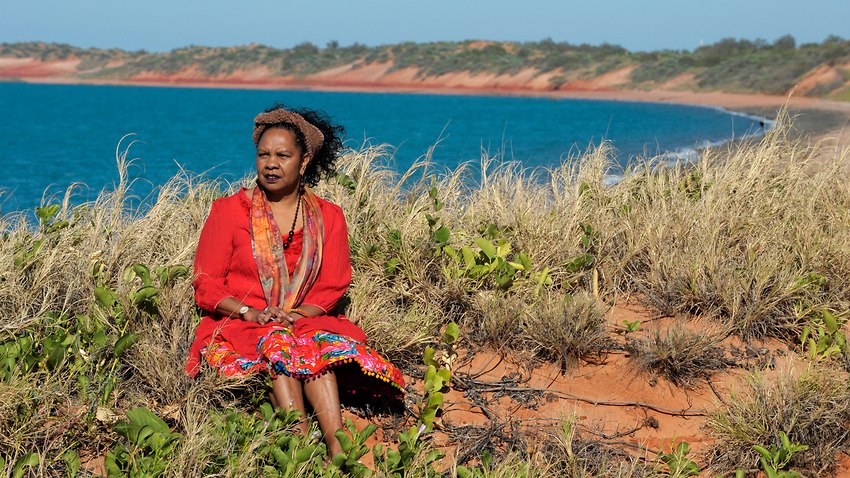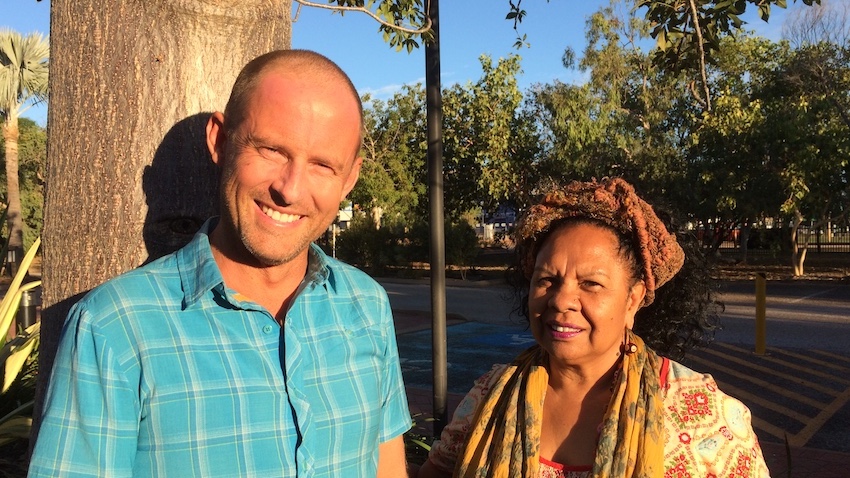Belonging To Country
Dr Anne Poelina on country.
The Kimberley, Western Australia.
Dr. Anne Poelina in conversation with Anthony James for The RegenNarration podcast
Photos courtesy of The RegenNarration
Dr Anne Poelina belongs to Mardoowarram, Lower Fitzroy River, in the Western Kimberley region of Western Australia. She has over 30 years’ experience in Indigenous Australian health, education, language and community development, is a qualified nurse and traditional midwife. She’s also the managing director of Madjulla Incorporated, an Indigenous community development NGO. She speaks to us about how Aboriginal knowledge can inform the transition into the new economy and what this might look like in a place like the Kimberley.
This edited conversation is brought to you by The RegenNarration podcast (formerly Rescope Radio), in collaboration with The Rescope Project. For the full podcast and more, including interviews with Tim Winton and Paul Hawken, head over to The RegenNarration. A big thank you goes out to interviewer Anthony James.
Dr Anne Poelina: Good morning and good day. My name is Anne Poelina and I am a woman who belongs to the Fitzroy River. So, in terms of property rights, I belong to the Fitzroy River.
Anthony James: Can you can explain that for the non-indigenous folk? What's the depth of meaning in that for you?
Meaning is a big word. Basically what we're talking about is our connectivity, or our connection, to country. For Indigenous peoples on this land we have thousands and thousands of years of connection to nature and our lived experience is very, very unique. One of the things that's starting to come into the fore is that Aboriginal peoples actually come from high culture; we come from the arts, from science, from all of these forms of knowledge making. So that connection grounds me on country, with country and to country and this is very important because my identity is constructed from a sense of place.
So we first met at Australia's first New Economy Conference a couple of years ago. How would you describe your connection with country and your interest in the new economy?
A lot of my work is around looking at how we can create these new economies. I think one of the things for me is that as a scientist and as a actionist–not an activist–I'm working globally. So my work is looking at the global connection of land, water and food security. But I guess one of the big impetuses that drives me is that we are human beings and as human beings we are all indigenous to Mother Earth. And so when I look at what I do one of the things is to be extremely inclusive because I'm talking about what's happening globally, particularly in terms of climate change. I was invited to attend the 30-year anniversary of the Intergovernmental Panel on Climate Change at UNESCO in March this year. That's 30 years of all of this knowledge that's come from a transdisciplinary approach of how scientists all across the globe are looking to create the strategies that are going to tackle climate change, which seems to be quickly spiralling into climate chaos. How do we as people who care about this planet, who come from multiple sources of knowledge, frame a system that gives the climate a chance?
Dr Anne Poelina in her element.
The Kimberley, Western Australia.
The way that we perceive the world and how we reflect that in language determines so much of how we act. You seem to spend a fair bit of effort focusing on that, trying to reframe how we think through how we talk and through the language we use.
It's interesting. I guess one of the things for me is that the work that I do, in terms of having actually gone from a very private space to a very public space, has meant that in the past I was heavily reliant on non-verbal communication. Because I'm in a different place now, in terms of where I need to be messaging, it's really forced me to frame language in a certain way because one of the things that I've learnt is that as scientists we have all the knowledge. There is not any more knowledge that we really need to have but somehow we are failing to take this message and connect to ordinary people, to the ordinary human being. That's why I tend to talk about collective wisdom. But one of the things that I'm starting to see is the combination and the collaboration with artists. That is very, very powerful because artists have a way of taking a story and creating meaning, helping the person that's receiving that story form a level of empathy, particularly to a sense of place. So it's not just scientific transdisciplinary knowledge systems but it's looking outside of ourselves, creating new knowledge, working with artists in terms of songs, poetry and dance. How do we connect the story that we're trying to tell so that we can bring the people with us? I think part of that is having an emotional connection to the story that we're trying to share.
And in the Kimberley this is something you're feeling very acutely right now. There's so much development in the old model being proposed or actually happening at the moment. I’m aware of the startling figure of 40,000+ gas wells for fracking licences in the offing which flies in the face of the sort of change you're talking about. So how are you feeling things in an acute sense here in the Kimberley at the moment? What is the state of play in terms of the progress towards the sorts of change that you're looking for?
I think you're right. What challenges me is the fact that we seem to be doing business in the old way. We seem to be using the same failed economic strategies to try and bring about wealth creation and jobs and a good quality of life for everyone, which everyone is entitled to. But what we're seeing is that it doesn't matter which government comes into power, whether it's Labor or Liberal, what we're seeing is what the old people say: "quick money". Governments are working hand in hand with corporations to look at how they can stay doing business the old way. Digging up the country for fossil fuels. It's quite insane in a way because it's no longer common sense. One of the things, in Australia, is we've signed off to the Paris agreement and we're supposed to be reducing our carbon emissions and yet our governments are full steam ahead continuing to collaborate with these multinational companies to gain and destroy a magnificent country. Now one of the things I wanted to say is that I'm not anti-business. What I'm saying is that what we should be doing is a little bit of a slow down, a little bit of a stock-take and a little bit of an audit in terms of what is actually in the Kimberley. It is a totally unique place. One of the things that I've been doing is looking at geoheritage and how we can overlay that with cultural heritage. That's come from the concept of Global Geoparks, which is a phenomenon that has not been picked up in Australia.
"From an Indigenous perspective our lives are, and will remain, codependent on these natural systems. It's a symbiotic relationship between nature and people and I think this is what we're looking at for the new economy."
Anthony James (left) and Dr. Anne Poelina (right).
Western Australia
"How do you wake up the consciousness of the people to show that Aboriginal peoples have been living and creating an amazing knowledge system that can take us into a new millennium or a new economy based on that collective wisdom and the sharing between non-Indigenous and Indigenous peoples?"
Can you talk a bit more about that?
So Global Geoparks is an idea that was started by Nelson Mandela. He looked at the cultural landscape of country and place. Global Geoparks give people an opportunity to go and really immerse themselves in the landscape and get a very deep experience because they're able to see and read the country from an Indigenous perspective. A lot of the science and a lot of the knowledge that's coming out at the moment is saying that when we connect with nature it's actually ecotherapy. Nature is very, very therapeutic. From an indigenous perspective what we talk about is energy and about energy systems. There's conversations now about nature having the right to life. Well from an indigenous perspective our lives are, and will remain, codependent on these natural systems. It's a symbiotic relationship between nature and people and I think this is what we're looking at for the new economy.
Describe some of your vision for what the new economy can look like. What component would would business take up, for example, in the Kimberley?
I think the Kimberley is well placed in regards to looking at big multinational companies and I'm really surprised that these big companies haven't started to look at what is here in terms of transitioning to renewables. So in the Kimberley we have massive geothermal potential. We have wave power, tidal power and the sun: all renewable energy sources. This is what we're calling the "forever industries", these industries that can go forever because this is an energy system that will not run out. It will not be destroyed. Also from an indigenous perspective the Kimberley is extremely unique because we have unique Indigenous peoples here that come from many different landscapes. We talk about the hill country, the river, the sea and the desert. That amazing diversity is also place-based and with all of those different areas we say that the law is in the land. The law is not in man. This is a unique knowledge system that has great benefit for mankind. What some of the old people say is, "How do you wake up the snake?" This means, how do you wake up the consciousness of the people to show that Aboriginal peoples have been living and creating an amazing knowledge system that can take us into a new millennium or a new economy based on that collective wisdom and the sharing between non-Indigenous and Indigenous peoples?
What's your observation of the shift in that over your lifetime? Are we getting somewhere on that front?
I think there's some very interesting conversations being created by prominent people. Recently, Tom Calma and Kerry Arabena went and presented to the Press Club in Canberra saying that non-Indigenous Australians need to have a sense a connection, a sense of connectivity, to this country that they call home. And so we're starting to see conversations happening. But part of the work I do requires a level of being brave and being able to get out there with a message that has a connection to fellow Australians. So it's a really interesting time I think in terms of some of the conversations that are going on around treaty and constitutional reform. One of the things I started saying a couple of years ago was that I think it's time for all of us, as Australians, to redefine who we are in modernity. I think we need to start to be brave.




